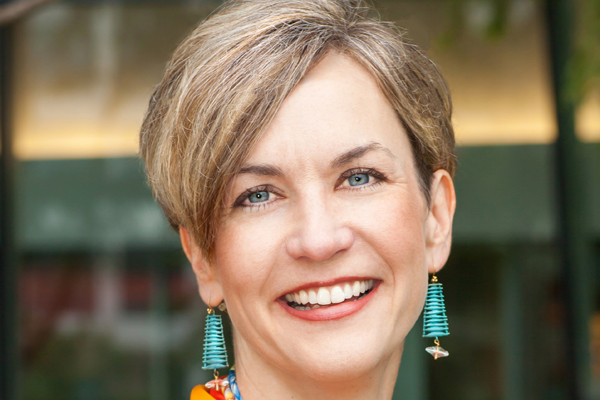Strong meat industry relationships help Potts with challenges
Strong meat industry relationships help Potts with challenges
- July 12, 2019 |
-
 bermangorvine bermangorvine
bermangorvine bermangorvine

As CEO of the North American Meat Institute, Julie Anna Potts tackles issues from food safety to animal welfare and consumer demands
 Potts
Potts
For Julie Anna Potts, becoming CEO of the North American Meat Institute was a natural progression in a career that has always centered on agriculture. Even her family draws her close to this world—her husband grew up on a farm in Louisiana, and she said she is "two generations off the farm" in her native Alabama.
Potts joined NAMI in September from the American Farm Bureau Federation, where she was executive vice president and treasurer. She is also a former chief counsel to the Senate Agriculture Committee. Potts said she found a close-knit world in the relatively small meat industry. NAMI represents companies that process 95 percent of red meat and 70 percent of turkey products in the United States, and also represents suppliers to these companies.
"They might compete like heck out in the marketplace, but there are a whole lot of issues common to them that make having a trade association very, very valuable," Potts said.
These issues include expanding international trade, securing a dependable labor supply and avoiding a "patchwork" of state regulations on such things as animal welfare.
"For example, California's Proposition 12 on cage sizes for veal calves and breeding sows will be a problem for our industry up and down the meat supply chain," Potts said.
Meat processors are also confronting changing consumer tastes—as well as consumer demands to know more about where their food came from and how it was raised and processed. U.S. consumers are eating far less beef than they did decades ago, though they have increased consumption of chicken. (The National Chicken Council represents the broiler chicken industry.) Another challenge: countering concerns that raising livestock, especially cows, contributes to greenhouse gases and climate change.
Potts says global demand for meat is growing, while independent surveys show that only about 5% of people in the U.S. don't eat any animal protein.
Nevertheless, the majority who enjoy meat "want to feel good about eating it," Potts said. "They want to understand everything from the way meat is produced to its nutritional profile."
Coming on board
Potts quickly got up to speed on the industry as the board launched an effort to develop new vision, mission and values statements. These statements, adopted by the board in April, reflect industry priorities and articulate more consumer-oriented goals. The vision statement commits NAMI members to "sustainably nourishing local and global communities with wholesome meat and poultry." The new mission statement: "Connecting people and resources to strengthen trust in the food we produce." NAMI's values are now encompassed in three words: stewardship, community and collaboration.
"It was a fantastic opportunity for me, being new and coming from outside the meat industry, to hear why (members) value NAMI," Potts said.
To help achieve NAMI's goals, Potts has overseen a staff reorganization. The public affairs and legislative affairs divisions were merged into a single department under Senior Vice President Pete Thomson, who formerly led legislative affairs only. Eric Mittenthal, who was vice president of public affairs, is now vice president of sustainability. He will oversee initiatives developed by a new "Trust in Animal Protein" task force, which aims to create a long-term program for engaging with consumers about their concerns with meat production and consumption. A report on moving forward with this initiative is due to the executive board at its July 11-12 meeting in Chicago.
Sarah Little joined NAMI in May as vice president of communications. She had been communications director to Sen. Pat Roberts (R-Kan.) and the Senate Committee on Agriculture, Nutrition and Forestry.
In Washington, "a lot of what we do ends up being what we stop from happening in Congress," Potts said. The five major issues NAMI is grappling with under her direction are animal handling, human health and nutrition, environmental stewardship, food safety, and worker safety and human rights.
"There is a lot of noise and disagreement at times," she said, and even supposedly authoritative governmental data can become controversial. Therefore, "to communicate effectively as an industry is a challenge."
Looking to the future
Potts is also looking at revenue streams for the association. NAMI was created in 2015 when the American Meat Institute and North American Meat Association merged. NAMA CEO Barry Carpenter stayed on to lead the new entity before retiring last year.
NAMI reported revenue of $10 million in 2017, according to the latest IRS information available, with another $3 million for the group's foundation. In the current year, Potts said, roughly 56% of NAMI revenue comes from dues, 21% from the convention and trade show, and the remainder from meetings, publications, management fees and other sources.
"We are examining strategies for growth in these areas as well as from new sources," she said. "NAMI is financially sound and sustainable, thanks to past leadership of Barry Carpenter and the board," but she is seeking to further "strengthen and diversify our financial position."
When asked how she sees her future five years from now, Potts said she hopes to have "maintained that glue, that sense of the organization as an essential business partner to the member companies, and improved on it."
Looking further into the future, she said, "I'm trying to get the organization to think about and talk about, and the industry to talk about, where we would like to be with consumers 10 years from now. Consumer perception is driving lots and lots of conversations in the supply chain."
